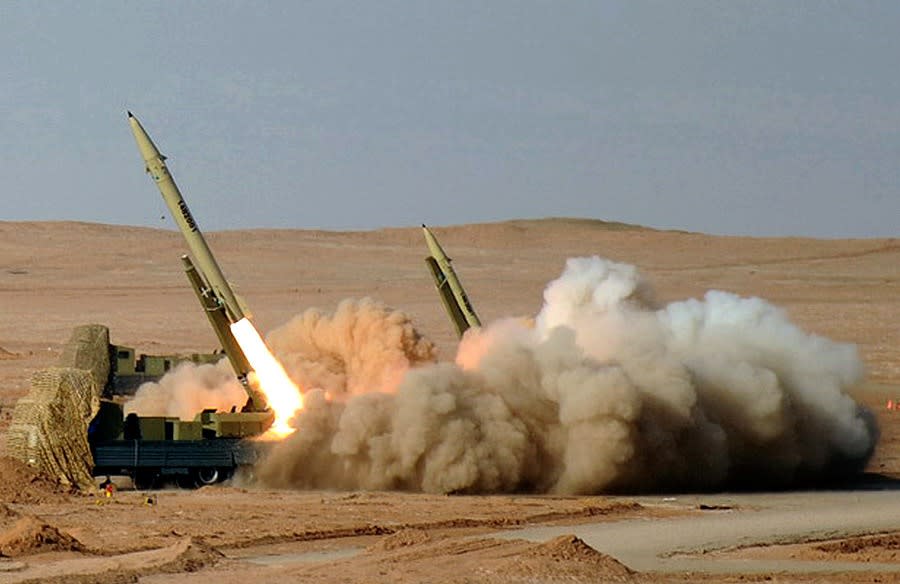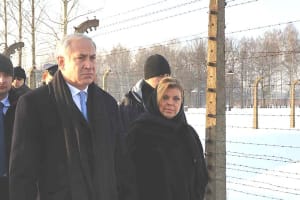We cannot ignore Iran’s global goals
Author notes Iran's history of attacks and ongoing threats against Israel and the U.S.

“Those who fail to learn from history are condemned to repeat it.”
Winston Churchill’s paraphrase of Santayana’s famous saying could easily be applied to Iran’s malicious behavior in world affairs.
Much of what we hear about Iran today concerns its obsessive ambition to join the world’s exclusive, nine-nation nuclear club—able to launch deadly attacks against enemies near and far. Whether or not they’re successful in that goal, their Supreme Leader—Ayatollah Ali Khamenei, who rules the Islamic Republic of Iran—cleverly carries out additional evil strategies bolstered by the elite Islamic Revolutionary Guard Corps (IRGC).
Iran’s constitution instructs the IRGC to pursue “an ideological mission of jihad in God’s way … extending sovereignty of God’s law throughout the world.” Since 1979, the IRGC’s power has expanded worldwide, enabling it to carry out the regime’s revolutionary, militant Shia Islamist religious ideology both inside Iran and out.
Today, Iran is the world’s largest exporter of terror. We simply cannot ignore its “diplomatic” efforts to recruit more surrogates like Hezbollah, Hamas, and Houthis. And these surrogates are closer than we think.
The 2015 Obama/Biden Iran deal has failed, and yet the Biden administration insists on trying to resurrect it. Whether the Iran deal lives or dies, our leaders and negotiators must revisit the history books for a refresher course on the past 43 years. They paint a dangerous picture of the Iranian leadership’s patterns of aggression, particularly against our military. The U.S. and other nations could benefit, too, from revisiting one of Islam’s concepts, taqiyah, which gives them permission to conceal their own beliefs for their own benefit.
Even if the Iran deal is abandoned, Iranian threats against our country remain. Let us take a look at Iran’s history with the United States. Beginning in 1979, with the hostage-taking of American embassy civilians in Tehran, the 444-day Iran hostage crisis set off a shocking U.S. (and international) predicament. Finally, the hostages were set free on Jan. 20, 1981, the day of President Ronald Reagan’s inauguration.
From taking American hostages in Iran until now, the Iran Revolution has relentlessly pursued its goal to reestablish a caliphate to dominate the world. Iran’s combative hatred for Israel extends to the entire Middle East, which views Iran as a threat. They are right to do so. Israel is a prime target, but the Sunni Muslim nations are despised by the Shia Muslim Iranian leaders who want their brand of Islam to dominate the region and the world!
Indeed, Iran has kept the United States, the most powerful nation in the world, in its crosshairs for the last 43 years. The horrific 1983 suicide truck bombing of the U.S. Marine barracks in Beirut, Lebanon, revealed Iran’s unmistakable fingerprints in causing the deaths of 220 Marines, 16 Navy personnel, and three Army soldiers.
Some may recall two U.S. embassy bombings in 1998 in Kenya and Tanzania. Iran, again, flexed its deadly terror muscles, resulting in 224 people murdered and thousands more wounded. In 2011, a U.S. federal court determined that “the government of Iran aided, abetted and conspired with Hezbollah, Osama Bin Laden, and al-Qaeda to launch large-scale bombing attacks against the United States.”
Between 2003 and 2011 in the war on terror, Iran targeted our U.S. military members stationed in Iraq by making and using improvised explosive devices (IEDs)—roadside bombs. Iran used its IRGC to carry out their attacks. The losses are irreversible tragedies for American families that led to the alleged injury and death of more than 1,000 U.S. service members.
In a 2016 article by the nonprofit research group Accuracy in Academia, experts sounded the alarm on Iran’s stealth strategies in establishing Iranian embassies and some 80 Islamic cultural centers, which function as outposts for proselytizing Latinos with Islamic doctrine. Since the 1980s, Latin America has been fertile ground for surrogate recruits taken in by Iranian “diplomacy.” Several of Iran’s key operating bases include Bolivia, Colombia, Nicaragua, Venezuela, and the island nation of Cuba—which is just 90 miles away from the Florida Keys. Right in our back yard.
On Jan. 12, 2021, former Secretary of State Mike Pompeo spoke at the National Press Club in Washington, D.C., where he announced, “The Iran-al-Qaeda axis poses a grave threat to the security of nations and to the American homeland itself, and we are taking action.” Three top al-Qaeda leaders live in a welcoming Iran. They are a perfect match. That same month, the Associated Press reported terror threats against Fort McNair in the U.S. capital and against the Army’s vice chief of staff.
Amid recent ongoing negotiations for a new Iran deal, a 2022 Annual Threat Assessment from the Office of the Director of National Intelligence (ODNI) reported that Iran is actively developing networks inside the U.S. That said, House Intelligence Committee Chair Adam Schiff and Secretary of State Antony Blinken agree that they are setting aside those threats for now and will deal with them at another time.
“These other malign activities of Iran’s, their plots against the U.S. personnel or Americans around the world we can deal with and have to deal with separately, and we should deal with them aggressively,” Schiff told CBS News’ “Face the Nation” on Sunday. “We need to go after all of this, not necessarily in one agreement.”
In April 2022, a group of 502 Iranian-American scientists, academics, and professionals sent a letter to Biden imploring him not to accept a request from Iran to remove the IRGC from the Foreign Terrorist Organization (FTO) designation. These Iranian-Americans are experts on the modern dangers of their former homeland.
More outcry against the Biden administration from various sectors includes the U.S. Senate, which voted in a bipartisan manner (62-33) to reject any Iran deal that does not require Iran to stop its terrorist activities and missile production and discontinue its China connections.
This is good news, but it does not change Iran’s threats to the U.S. with its expansive presence throughout Latin America.
“The Iranian regime, for three-and-a-half decades and counting, has been … exporting its revolutionary ideals to your own backyard in Latin America,” Dr. Emanuele Ottolenghi explained during a panel discussion about Israel at the Faith and Freedom Coalition’s “Road to Majority Conference.”
Israel, however, best understands Iran’s terror and takeover motives. Defending the front lines of their freedom, for many nations—including Abraham Accords friends and the United States—they are a bulwark against Iran’s goals to rule the world. Israel is a “freedom friend” yet is vilified at every opportunity by those who attempt to placate the imams.
Proverbs 14:15 instructs us “The simple believes every word, but the prudent considers well his steps.” The Iranian flag waving in the breeze gives us a visual description of the kind of nation its leaders are promoting at the expense of their own beleaguered citizens and the world. Its tricolor flag of green, white and red shows Iran’s national emblem in the middle. It is an artistic effect representing the word “Allah” in the shape of a tulip. The tulip, in red, is considered a symbol of martyrdom.
May we in the Christian community keep Psalm 23:4 close in our thoughts as we face the disturbing realities in our nation and around the world. I love this verse best in the King James Version: “Yea, though I walk through the valley of the shadow of death, I will fear no evil; for You are with me; Your rod and Your staff, they comfort me.”
This article was originally published here.

A speaker and consultant, Arlene Bridges Samuels authors the weekly feature column for The Christian Broadcasting Network/Israel on their Facebook and Blog since 2020. Previously she pioneered Christian outreach for the American Israel Public Affairs Committee (AIPAC). Retiring after nine years, she worked part-time for International Christian Embassy Jerusalem USA as Outreach Director for their project, American Christian Leaders for Israel (ACLI) Arlene is an author at The Blogs-Times of Israel, often traveling to Israel since 1990. By invitation she attends the Israel Government Press Office (GPO) Christian Media Summits as a recognized member of Christian media worldwide. Read more of her articles at CBN Israel blog. Arlene and her husband Paul Samuels have coauthored a book, Mental Health Meltdown, illuminating the voices of bipolar and other mental illnesses. On Amazon













